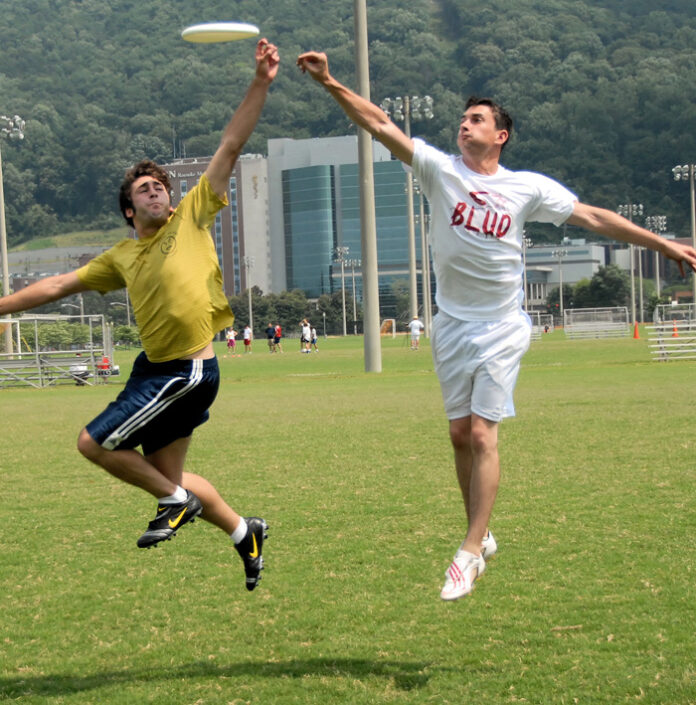
If you see a group of players in the park, running around erratically throwing a Frisbee, don’t assume they’re out for just a casual throw.
With an intensity that matches their love for the game, these folks pride themselves on being “ultimate” Frisbee players. The activity is not your everyday game of pitch and catch from your family picnic. Instead, it’s a rugged, fast-paced, soccer-like team sport that pits one team against another… with the “ultimate” goal of scoring 15 points to win the game.
Sound unconventional? It is. Mike “Smiley” Glowczynski, President of the Roanoke Ultimate and co-captain of BLUD (Big Lick Ultimate Disc) team, who has been playing Ultimate for over 10 years (often in city parks), says what attracts people to play this game is that it is “completely different from any other sport. In other sports, the ball basically goes in a straight line. In Ultimate, you can curve the disc around your defender.” It’s also just fun chasing it down.
The rules of the sport are straightforward. Ultimate Frisbee is played with 7 players on each side. The Frisbee is thrown from one team player to the next in succession and cannot be carried down the field by a player after the Frisbee is caught. The player must stop then and throw to the next player. At the same time, defenders are constantly trying to intercept the Frisbee or just knock it down. If the Frisbee hits the ground, possession immediately goes to the other team who work in the opposite direction towards the other goal.
There are two player positions on each team: “handlers” and “poppers”. A handler is similar to the quarterback in football. A good handler must be able to quickly map out a strategy and start attacking the defense. A popper needs to be fast on their feet and a high leaper… and willing to withstand some physical abuse when his or her body collides with another player or lands directly on the ground.
With such intensity and with no shoulder or knee pads to protect you, some minor injuries do occur, but they are usually limited to relatively minor bruises and sore ribs since there is no tackling allowed and players on both sides are usually moving in the same direction.
Due to these simple rules, but also due to respect for the game, Ultimate is one of the last remaining games to be self-officiated…which means the players call their own fouls just like in a pick-up game of basketball. The “honor system” works well.
The BLUD club plays regularly in parks and on soccer fields. They communicate practice schedules and game times with each other through a web site, which also doubles to attract other players who are interested in joining them. All skill levels are welcome.
Ryan Colby, who moved from Pittsburgh to Blacksburg to study for a Masters degree in Mechanical Engineering at Virginia Tech, drove to Roanoke recently for a pick up game only three days after moving down from Pennsylvania.
In addition to college students like Colby and Chris Hurd, a Cave Spring and Radford University graduate, there are people from different demographics who play the game as well. Some play for the intense competition, others for the love of the game and some simply to stay in shape.
Dr. David Johnson, Dean of School of Natural Sciences and Mathematics at Ferrum College, is a long time player…who does it all at age 61. Johnson is one who still “lays out for one” – a term used by ultimate players to describe someone diving for the disc without regard for their body. Glowczynski continues, “Dave is really a nice guy and an inspiration to us all. He’s both a student and also a great teacher of the game.”
Ultimate is not limited to just men. It is also popular with women, as evidenced by the fact that there are now women’s teams as well as mixed and co-ed teams. There are 27,000 members in the Ultimate Players Association nation-wide. Ultimate is here in the Roanoke Valley and could “ultimately” stay here for a long time.
By Wade Thompson [email protected]

